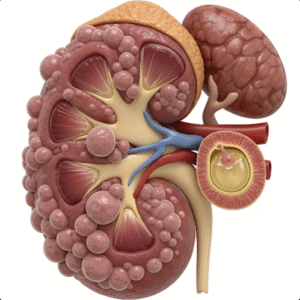Overview
Glomerulonephritis (GN) refers to a group of kidney diseases characterized by inflammation of the glomeruli—the filtering units of the kidneys. In South Korea, GN remains a significant cause of kidney-related morbidity and mortality, with evolving patterns in its epidemiology and clinical outcomes.
What is Glomerulonephritis?
GN encompasses various conditions that affect the glomeruli, leading to impaired kidney function. It can be classified into:
- Primary GN: Diseases that originate within the kidneys, such as IgA nephropathy (IgAN), minimal change disease (MCD), and focal segmental glomerulosclerosis (FSGS).
- Secondary GN: Conditions resulting from systemic diseases, including lupus nephritis and infections.
Symptoms
Common symptoms of GN include:
- Hematuria (blood in urine)
- Proteinuria (excess protein in urine)
- Edema (swelling, particularly in the face, hands, and feet)
- Hypertension (high blood pressure)
- Decreased urine output
- Fatigue
Causes
The causes of GN vary and can include:
- Infections: Post-streptococcal glomerulonephritis (PSGN) and viral infections.
- Autoimmune Diseases: Conditions like systemic lupus erythematosus (SLE).
- Genetic Factors: Inherited conditions such as Alport syndrome.
- Vascular Diseases: Conditions like vasculitis.
- Other Factors: Diabetes, hypertension, and certain medications.
Risk Factors
Risk factors for developing GN include:
- Family history of kidney disease
- Chronic infections
- Autoimmune disorders
- Uncontrolled hypertension
- Diabetes mellitus
Complications
Without proper management, GN can lead to:
- Chronic kidney disease (CKD)
- End-stage renal disease (ESRD)
- Cardiovascular complications
- Increased risk of infections due to immunosuppressive treatments
Prevention
Preventive measures include:
- Regular screening for at-risk populations
- Early treatment of infections
- Management of underlying conditions like hypertension and diabetes
- Adherence to prescribed medications and lifestyle modifications
Treatment Options in Korea
General Management
Treatment strategies for GN in Korea involve:
- Medications: Use of corticosteroids, immunosuppressants, and angiotensin-converting enzyme inhibitors (ACE inhibitors).
- Dialysis: For patients progressing to ESRD.
- Kidney Transplantation: Considered for eligible patients with end-stage kidney failure.
Specialized Care in Korea
South Korea boasts advanced medical facilities for GN management:
- Seoul National University Hospital: Offers comprehensive nephrology services.
- Asan Medical Center: Renowned for its kidney transplant program.
- Samsung Medical Center: Provides specialized care for glomerular diseases.
Public Health Measures
The Korean government implements various initiatives to address GN:
- National Screening Programs: Aimed at early detection of kidney diseases.
- Public Awareness Campaigns: Educating the public on the importance of kidney health.
- Research Funding: Supporting studies on the epidemiology and treatment of GN.













